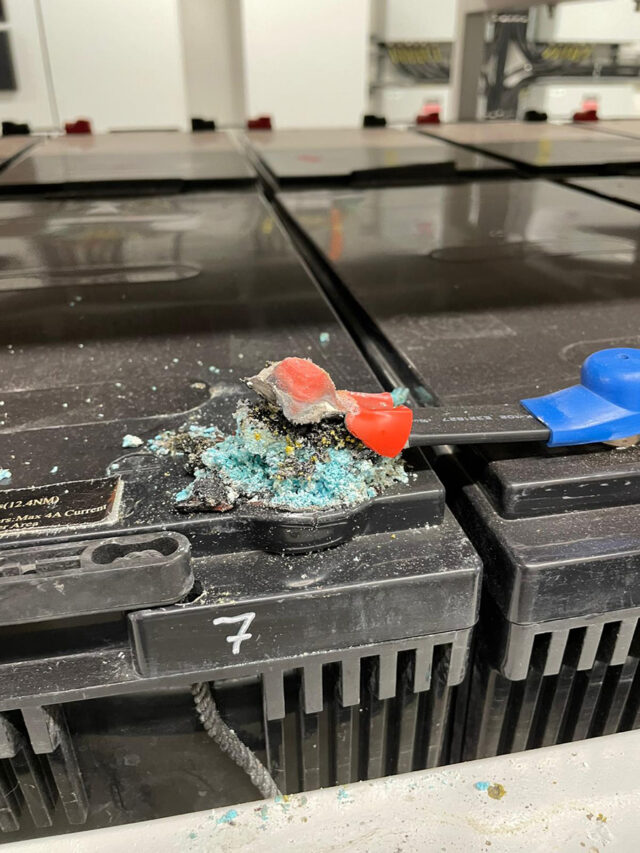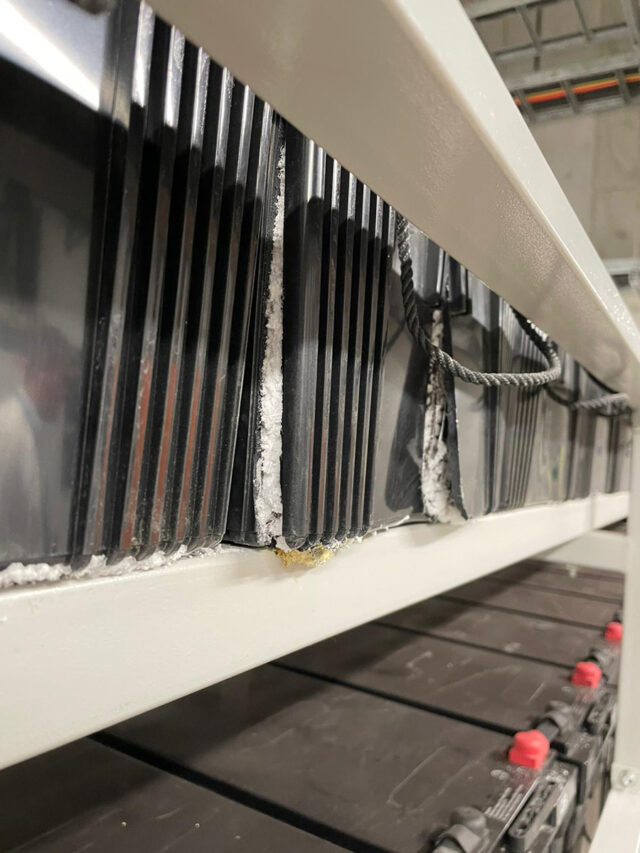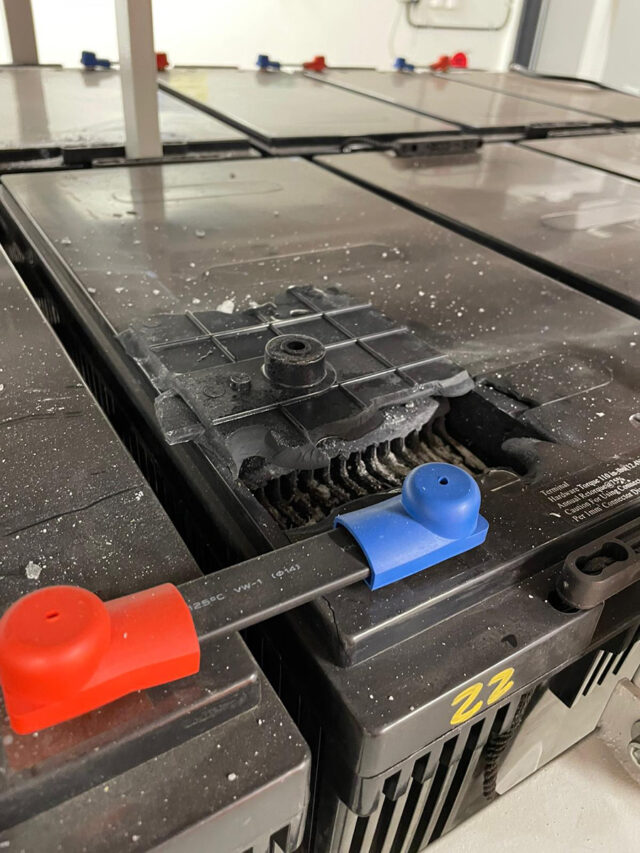 Your UPS batteries are the heart of your power protection system – and like any essential component, they have a limited lifespan. Most VRLA batteries require replacement every 3-5 years, while lithium-ion batteries typically last 8-10 years.
Your UPS batteries are the heart of your power protection system – and like any essential component, they have a limited lifespan. Most VRLA batteries require replacement every 3-5 years, while lithium-ion batteries typically last 8-10 years.
However, factors such as usage, environmental conditions, and maintenance practices can significantly impact battery life – meaning some systems may need attention sooner to ensure optimal performance and reliability.
Knowing the warning signs of battery degradation can help you prevent unexpected downtime and avoid costly disruptions to your business operations.
6 Common Signs Your Lithium-Ion UPS Batteries Need Replacing
There are many warning signs of battery degradation that mean it may be time to replace your batteries or the UPS system entirely, depending on the age of the unit. They include:
- Reduced Runtime or Backup – If your UPS isn’t holding power as long as it used to, the battery capacity may have deteriorated. Shorter backup times are one of the clearest indicators that your batteries are nearing the end of life.
- Swelling or Bulging – Visible swelling or warping of the battery casing signals internal chemical breakdown within the batteries; a serious issue that can compromise both safety and performance.
- Leaking, Corrosion or Residue – Any signs of fluid leakage, residue, or terminal corrosion indicate battery failure and require immediate replacement to avoid further system damage.
- Fault Indicators or Warning Alarms – Modern UPS systems monitor battery health and will display warning lights or alarms when internal diagnostics detect low capacity or battery faults.
- Overheating or Unusual Odours – Batteries running hot to the touch, or emitting a burning or metallic smell, are likely suffering from internal faults; a sign that the batteries need to be urgently replaced.
- Inconsistent Performance or Random Shutdowns – If your UPS is failing to switch to battery power during outages or shutting down unexpectedly, the batteries may no longer be supplying adequate energy to the system.
 Environmental Factors Affecting Battery Life
Environmental Factors Affecting Battery Life
Environmental conditions play a crucial role in determining the lifespan and performance of your UPS batteries. Whether you’re using lithium-ion UPS batteries, lead acid batteries, VRLA batteries, or SLA batteries, understanding how factors like temperature and humidity affect your system can help you make the right choice for cost-effectiveness, security, and reliability.
Temperature is one of the most significant factors influencing battery health. High temperatures can dramatically shorten the life of both lithium-ion and lead-acid batteries, causing them to degrade faster and lose capacity. On the other hand, low temperatures can reduce battery performance and slow down charging, which may impact the reliability of your UPS during critical moments. Lithium-ion UPS batteries generally offer better performance across a wider temperature range compared to traditional lead-acid or VRLA batteries, making them a strong choice for environments where temperature control is challenging.
Humidity is another environmental risk to consider. Excess moisture in the air can lead to corrosion and internal damage, particularly in VRLA and SLA batteries. This not only reduces the lifespan of the battery but can also compromise the security and safety of your entire UPS system. Maintaining a controlled environment with stable humidity levels is essential to protect your investment and ensure ongoing reliability.
The choice of battery type also affects how well your UPS system can withstand environmental challenges. While lead acid batteries, including VRLA and SLA types, have been widely used for their affordability, they may not always deliver the same level of reliability or cost effectiveness as lithium-ion UPS batteries, especially in demanding conditions. Lithium-ion batteries offer several advantages, such as longer lifespan, higher energy density, and better resilience to temperature fluctuations, making them a preferred option for many modern UPS applications.
Security and safety measures are vital to protect your batteries from physical damage, overcharging, and deep discharging. Implementing proper safeguards not only extends battery life but also reduces the risks associated with battery failure, helping you maintain the reliability and security of your UPS system.
Regular maintenance and monitoring are key to identifying potential issues before they escalate. By keeping a close eye on your batteries’ condition, you can maximise the advantages of your chosen battery type and ensure your UPS continues to deliver dependable power protection.
When selecting a UPS battery, it’s important to find a solution that matches your specific environmental conditions. Consider factors such as operating temperature, humidity levels, and the required reliability for your application. By carefully weighing these elements, you can make an informed choice that balances cost, performance, and long-term security—ensuring your UPS system remains a reliable safeguard for your critical infrastructure.
 The Cost-Effectiveness of Proactive Preventive Maintenance
The Cost-Effectiveness of Proactive Preventive Maintenance
Routine proactive servicing is the most effective way to prevent costly downtime and extend the lifespan of your UPS systems. Through a preventative maintenance agreement, NPS ensures your UPS equipment and batteries are regularly inspected, tested, and serviced to identify potential risks before issues arise.
This proactive approach helps detect early signs of wear, optimise the performance of power protection systems, and reduce the risk of unexpected failures.
By scheduling routine maintenance, businesses can maintain reliable power protection, minimise operational disruptions, and ensure their critical infrastructure continues to run efficiently and safely year-round.
Stay Ahead with Routine Servicing
Well-maintained batteries are essential to preventing downtime and ensuring your critical infrastructure operates efficiently and reliably. Regular servicing and timely battery replacements form an integral part of any power protection strategy.
By staying on top of maintenance, you’ll:
- Protect your business operations from unexpected outages and disruptions
- Reduce long-term costs through preventative maintenance
- Safeguard your critical infrastructure from damage
Don’t Wait Until It’s Too Late
Don’t let power protection fail when you need it most. Book your UPS servicing today to assess the battery health of your UPS systems and replace aging units before they cause disruption.
Ask our friendly team today about preventative maintenance operations to keep your business online and protected without interruption.

